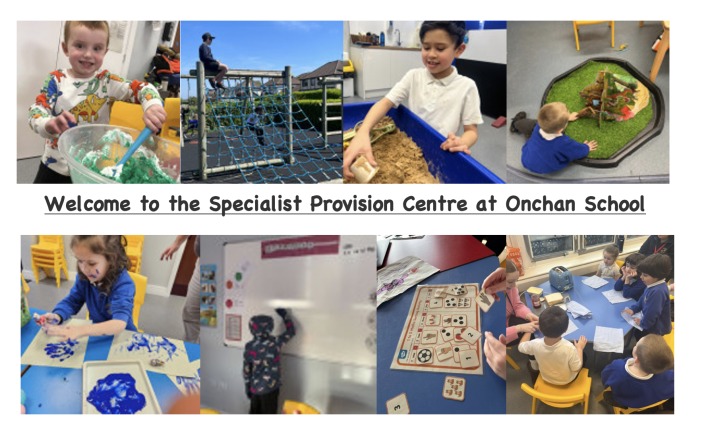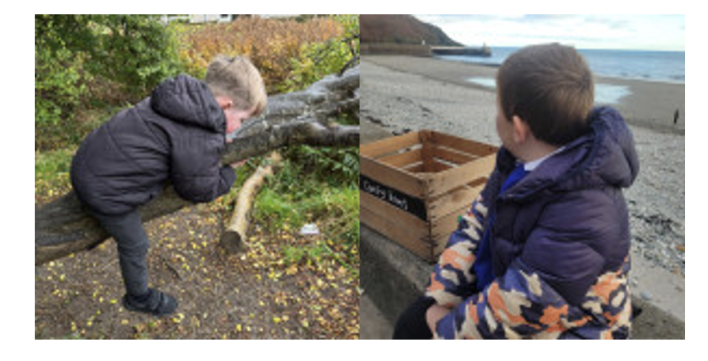The SPC is known as Seals and has 3 classes, Turtles, Dolphins and Lizards. Children are carefully placed in the classroom space that best suits their own individual needs and learning styles. Following a complete refurbishmen in the Summer of 2024, we are able to offer a purposeful learning environment, a well-equipped sensory room, kitchen, calm room and dedicated outside space. Our team of Senior Education Support Officers and Education Support Officers work alongside 2 teachers to create a bespoke curriculum for each child in our setting. Inclusion is at the heart of our ethos, and you will find children from the SPC accessing mainstream lessons and extra-curricular activities as well as mainstream children coming to the SPC at lunchtimes to interact with our SPC children.
New Starters 2026
Please see below for all the information you need to start at Onchan Specialist Provision Centre in September 2026.
If there is something missing or you are unsure of, please see our School Information tab on our main page where you can find out more. For any other queries, please e-mail our school office at: OnchanEnquiries@sch.im
Our Parent Booklet is a great place to start finding out about starting school in September:
EviSense
We use EviSense software for sharing photos, videos, and observations of our children learning. Parents have their own logins and are able to share in their child's day and see their progress. Parents are also encouraged to share photos and videos of their child's experiences at home. This collaboration sharing successes means staff and families can combine their knowledge and achieve the best outcomes for the child.
Please follow the link for more information: https://evisense.com
Curriculum
At Onchan SPC we use the EQUALS curriculum, a holistic curriculum designed to meet the diverse needs of our learners. The curriculum is divided into 4 pathways - The PMLD Pathway, Informal Pathway, Semi-Formal Pathway and Formal Pathway. Through getting to know our children individually, communicating with parents/carers, other agencies and professionals, we are able to assess our children and plan a comprehensive curriculum pathway which allows all children to reach their full potential.
Pathways
What our curriculum looks like at a glance:
https://onchan.sch.im/site/uploads/pages/6/_media/20250916_342bf817/Formal_Pathway.pdf
Individual Educational Plan (IEP)
Every child will have their own individual educational plan (IEP). This document contains carefully selected targets covering core areas of learning as well as a target selected in collaboration with the family to develop a skill which will help with life at home. These targets are used to inform the content of each child's daily workstation activities and their subsequent learning tray which is completed with the support of an adult. This designated 1:1 learning time ensures children have the support and opportunity to meet their targets and fulfil their potential. Working closely with trusted support staff allows children to engage with learning, take risks and challenge themselves. IEPs are updated on a regular basis and are specific to each individual child.
Sensory Play
Sensory exploration is a key part of the curriculum and covers the 8 senses, touch, taste, smell, sound, sight, proprioception (movement), vestibular (balance) and interoception (internal). Together these senses inform us of the world around us and our place within it. Sensory processing is a key skill, and many children have either an over-stimulated or under-stimulated response in one or more sensory areas. This leads to different behaviours. If a child has an over-stimulated response, they are likely to be sensory defensive and reject things that trigger that sense. If a sense is under-stimulated then the child is likely to engage in sensory seeking behaviours. For example, an over-simulated response to touch could lead to the child being sensory defensive, not wanting to touch or engage with certain textures. An under-stimulated response to touch is likely to result in sensory seeking behaviour and these children will engage with different textures, often wanting to engage the whole body, eg submerging their bodies underwater, or covering their whole arms in paint. Our role is to balance out these sensory needs. For those that are sensory seeking, engaging with that sense will help ground the child by fulfilling that need. For those that are sensory defensive, learning to engage with that sense will help to better engage with the world, develop strategies to help them cope when they trigger that sense, and give a richer life experience. A learning goal for a child who is sensory defensive towards touch would work towards accepting new textures such as water, sand, shaving foam, rice, beans, pasta, snow, slime, and cereal to name a few. Staff use these opportunity to model language as well as encourage engagement and exploration, while learning to play alongside, and with, peers.
Outdoor Learning
We offer our children a variety of outdoor learning experiences, including a weekly Forest School session in the Outdoor Learning area. Trips to outdoor spaces such as glens, beaches and plantations allow our children to experience the diverse natural environments that the Isle of Man has to offer. Research shows that time spent in natural environments play a key role in helping people to feel grounded and help regulate emotions. We make use of all the areas around our school including Reception's playground which has a stage and an outdoor kitchen, the main school playground with its array of outside toys, the school field, and the adventure playground complete with climbing equipment. We also have an enclosed outdoor area for summer water play, learning to ride bikes and playing with a variety of outdoor equipment.
My Physical Well-Being
Children are provided a variety of opportunities to develop their physical well-being. All children are offered swimming sessions with a qualified SEND swimming instructor at Glencrutchery Swimming Pool or Hydrotherapy at St Ninian's Lower School. Children take part in weekly P.E lessons to develop discrete skills, and sensory circuits to improve balance and co-ordination. In addition, children can attend MSR sessions at the NSC, bike4life sessions at the NSC outdoor track and gymnastic sessions at MGCE, all led by qualified staff. 4 children every year also get the opportunity to go horse riding for a term, run by Riding for the Disabled.
My Independence
Our curriculum places a heavy focus on life skills and independence, with the long-term aim of equipping learners with the skills to be as independent as possible as an adult. This work begins when the child starts in reception. Key areas are dressing, shopping, cooking, handling money, road safety, travelling on public transport and hygiene. Dressing is practised following swimming lessons, and learners are encouraged to dress themselves. We support learners to make their own decisions, for example, deciding on whether to wear a coat based on the weather. Children learn to make their own shopping lists from recipes and go to the shops to buy the ingredients. They practise key cooking skills such as pouring, measuring, chopping and mixing. Children learn kitchen safety rules, hygiene and how to clean up. Road safety is taught every time we leave the school environment, and older children learn how to travel on a public bus, from how to stop the bus, to buying a ticket and finding a seat. All these skills combine to provide each child with the best opportunity for fulfilling their potential and having a positive adulthood.
My Communication
At Onchan SPC we focus on total communication. We use various strategies to promote communication such as visual images on cards, communication books, objects of reference (such as showing a child a nappy before changing them), using sign from sign-a-long, and allowing children to lead us to what it is they want/need. Many of our children are gestalt language processors and we work closely with Speech and Language Therapists to develop targets which allow the children to communicate clearly in the manner that best suits them. Communication forms a part of all areas of the curriculum and is not a stand alone subject. Empowering our learners to use the communication tools that best suit their needs allows them to have a voice and to be heard. Having relationships with support staff and teachers built on trust allows our learners to feel comfortable and confident when communicating their needs/wants, likes/dislikes and frustrations. Emotional literacy is also taught to allow children to express how they are feeling and helping them to feel validated when their emotions are identified.
We are very proud of our SPC and the contribution our children make to the School.






